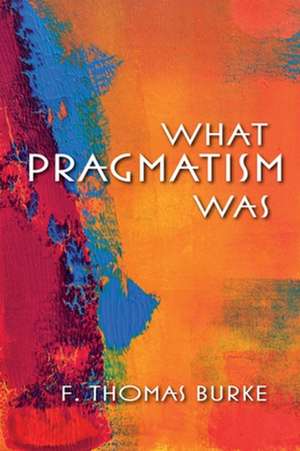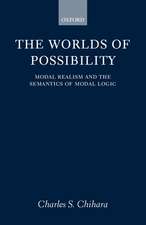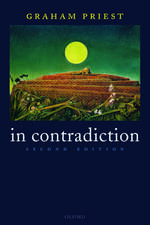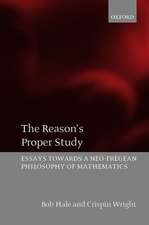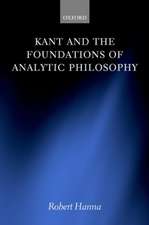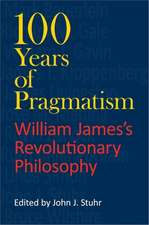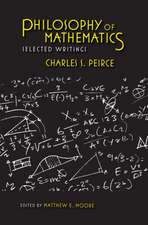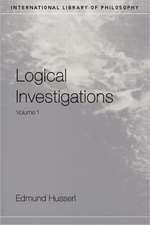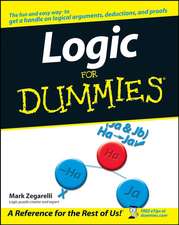What Pragmatism Was: American Philosophy
Autor F. Thomas Burkeen Limba Engleză Paperback – 13 iun 2013
| Toate formatele și edițiile | Preț | Express |
|---|---|---|
| Paperback (1) | 199.88 lei 6-8 săpt. | |
| MH – Indiana University Press – 13 iun 2013 | 199.88 lei 6-8 săpt. | |
| Hardback (1) | 447.06 lei 6-8 săpt. | |
| MH – Indiana University Press – 13 iun 2013 | 447.06 lei 6-8 săpt. |
Din seria American Philosophy
-
 Preț: 200.80 lei
Preț: 200.80 lei -
 Preț: 152.72 lei
Preț: 152.72 lei -
 Preț: 126.81 lei
Preț: 126.81 lei -
 Preț: 158.55 lei
Preț: 158.55 lei -
 Preț: 144.38 lei
Preț: 144.38 lei -
 Preț: 174.08 lei
Preț: 174.08 lei -
 Preț: 315.85 lei
Preț: 315.85 lei - 19%
 Preț: 504.96 lei
Preț: 504.96 lei -
 Preț: 290.69 lei
Preț: 290.69 lei -
 Preț: 220.61 lei
Preț: 220.61 lei - 19%
 Preț: 503.56 lei
Preț: 503.56 lei -
 Preț: 291.28 lei
Preț: 291.28 lei - 19%
 Preț: 561.30 lei
Preț: 561.30 lei - 19%
 Preț: 592.33 lei
Preț: 592.33 lei - 19%
 Preț: 502.32 lei
Preț: 502.32 lei -
 Preț: 524.79 lei
Preț: 524.79 lei -
 Preț: 286.65 lei
Preț: 286.65 lei - 19%
 Preț: 530.39 lei
Preț: 530.39 lei -
 Preț: 290.90 lei
Preț: 290.90 lei -
 Preț: 283.01 lei
Preț: 283.01 lei - 19%
 Preț: 507.16 lei
Preț: 507.16 lei - 19%
 Preț: 560.81 lei
Preț: 560.81 lei -
 Preț: 275.17 lei
Preț: 275.17 lei -
 Preț: 391.56 lei
Preț: 391.56 lei -
 Preț: 288.02 lei
Preț: 288.02 lei - 19%
 Preț: 554.34 lei
Preț: 554.34 lei - 19%
 Preț: 566.58 lei
Preț: 566.58 lei -
 Preț: 285.88 lei
Preț: 285.88 lei - 19%
 Preț: 553.58 lei
Preț: 553.58 lei -
 Preț: 264.02 lei
Preț: 264.02 lei - 19%
 Preț: 565.49 lei
Preț: 565.49 lei -
 Preț: 256.89 lei
Preț: 256.89 lei -
 Preț: 489.07 lei
Preț: 489.07 lei - 19%
 Preț: 634.26 lei
Preț: 634.26 lei -
 Preț: 274.51 lei
Preț: 274.51 lei -
 Preț: 259.22 lei
Preț: 259.22 lei -
 Preț: 249.62 lei
Preț: 249.62 lei - 23%
 Preț: 665.08 lei
Preț: 665.08 lei
Preț: 199.88 lei
Nou
Puncte Express: 300
Preț estimativ în valută:
38.25€ • 39.93$ • 31.65£
38.25€ • 39.93$ • 31.65£
Carte tipărită la comandă
Livrare economică 04-18 aprilie
Preluare comenzi: 021 569.72.76
Specificații
ISBN-13: 9780253009586
ISBN-10: 0253009588
Pagini: 256
Ilustrații: 7 figures
Dimensiuni: 152 x 227 x 19 mm
Greutate: 0.36 kg
Editura: MH – Indiana University Press
Seria American Philosophy
ISBN-10: 0253009588
Pagini: 256
Ilustrații: 7 figures
Dimensiuni: 152 x 227 x 19 mm
Greutate: 0.36 kg
Editura: MH – Indiana University Press
Seria American Philosophy
Cuprins
Preface ; Acknowledgments Introduction: The Pragmatic Maxim ; 1. Peirce's Early Presentation of the Maxim; 2. James's Presentation of the Maxim; 3. Peirce's Later Versions of the Maxim ; 4. A Composite Sketch of the Maxim ; 5. Empiricism versus Pragmatism ; 6. Measurement and the Observer Effect ; 7. Perception and Action; 8. Addams and the Settlement Movement ; 9. Truth, Justice, and the American Pragmatist Way ; 10. Twelve Misconceptions of Pragmatism ; Conclusion: Belief and Meaning Appendices ; Bibliography; Index
Recenzii
"An insightful reading of the similarities and differences between pragmatism as it was developed by William James and pragmatism as C. S. Peirce developed it. Identifying these two strands of pragmatism provides Burke with an analytical tool for placing pragmatism in relation to the work of Carnap, Quine, and more recent neo-pragmatists and for offering a clarification of what it means to be a pragmatist in the present world." Scott Pratt, University of Oregon"Sorts out the rather muddled variety of ways the idea of pragmatism is used in academe and in public life and looks back at what pragmatism was to help establish some parameters for understanding what it has become and how it can be more effective." Nathan Houser, Indiana University-Purdue University, Indianapolis
Notă biografică
Descriere
Unravels the complex history of pragmatism and discusses contemporary conceptions
